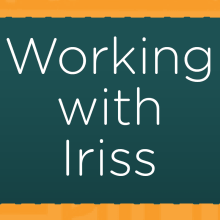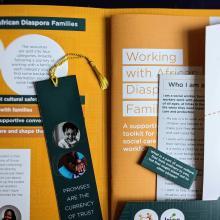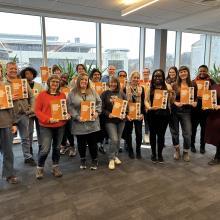Here at Iriss we have been thinking about Mental Health Awareness Week, which ran from the 15th to the 21st of May. It got me contemplating the complexity of navigating emotions, health, systems, work, life, and everything in between.
The focus of this year's Mental Health Awareness week was 'anxiety'. This made me reflect on the role that anxiety plays in our work. In particular it made me think about how it relates to some of the new projects that I am working on this year.
Anxiety is one of the most common mental health challenges that we face. It has many forms, and can emerge in many different settings. It is a perfectly normal and (sometimes) passing response to uncertainty, stress, sadness or fear. When we live more chronically in a state of anxiety then it can take on its own shape and become something that feels more stuck to who we are.
For me, anxiety is rooted in a sense of feeling out of control. In a work setting, it might come at the very beginning of a project – before I know the parameters or have built a relationship with partners that I’ll be working alongside. It might come at a point where I want to deliver a piece of work but for some reason I am hitting a roadblock. When anxiety does come along it can erode the hopefulness that I want to keep in my work, and there can be that niggling dread of what may happen if things go wrong.
This lingering anxiety can also be linked with things that are happening way beyond our control, something that we have all maybe felt more in the last few years - whether it be linked to COVID, or to current challenges around the cost of living.
In my current work with Passion4Fusion we are going to be creating a toolkit for social workers working with African families. We had our first get together recently and members of the team were feeling anxious because of the conflict in Sudan, an area of the world where they had direct links and friends and family. This real world situation creates a sense of uncertainty based on a fear that is, in no uncertain terms, justified. So how do we move forward when we are working in a world that is full of things we can’t control? It can be difficult sometimes to see a hopeful way forward in things we can influence, when some things beyond that influence are feeling pretty hopeless.
And I see that all the time in the work I do in social work and care. We can make progress in one area, but also feel dejected that there is so much more to be done.
I find systems thinking is a useful framework to help me control that thinking. It allows us to think of the individual in a system – made up of their physical health, their emotional landscape, their relationships and their environment. We can scale up and see them as part of a system - their organisation or community. We can zoom out further to see structural systems such as racism, prejudice, and inequality at play. By being able to zoom in and out like this, we can focus on different aspects of the system at different points. Most usefully for me, amongst that framing, we can find those things that we can influence, and focus on the things that will make a difference to people’s care and support. And while doing that – to make sure those changes can flourish – we can attempt to expose and chip away at the other parts of the system.
Often, there are ways individuals try to help themselves to hold off feelings of anxiety or inadequacy. I recently delivered a session in Aberdeenshire with newly qualified social workers. We were exploring the types of stress and anxiety that are experienced around writing case notes. Social workers are under a lot of pressure to write well, to include the voices of the people they support, and to demonstrate their analysis of situations. For a newly qualified social worker this can be a daunting task. We talked about ways that they manage their anxiety before starting writing. We discussed the different ideas that people had to help them settle themselves before they begin. Ideas included looking at photos of loved ones on a phone, taking a short walk before beginning, having a tea, talking about worries with a colleague, brain dumping using a dictation app, or free writing techniques. While everyone in the group acknowledged that they did find writing stressful, everyone had different ideas for things that support them to feel calmer before they begin. It was great to spend time as a group acknowledging the impact of uncertainty at work – personally and in practice.
“I feel like I was ‘comfortable’ with accepting that writing is a hard part of the job, and that I just needed to get on with it. Now I feel reassured that lots of people share the same anxieties and that it is ok to feel stressed – and there are ways to manage it.”— Workshop participant
Going forward with these new projects I know anxiety won't be the prevailing theme. However I'm very open to acknowledging it where it arises. I want to support my project partners to work through the difficult emotions that are inevitable if we are to progress and make real change in the Scottish social care system, and often that starts by reflecting together to acknowledge how these feelings sit within us, and sharing how we overcome that to do the important work of supporting those we provide care and support for.




